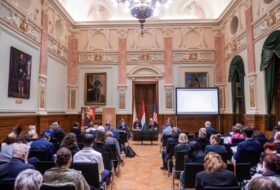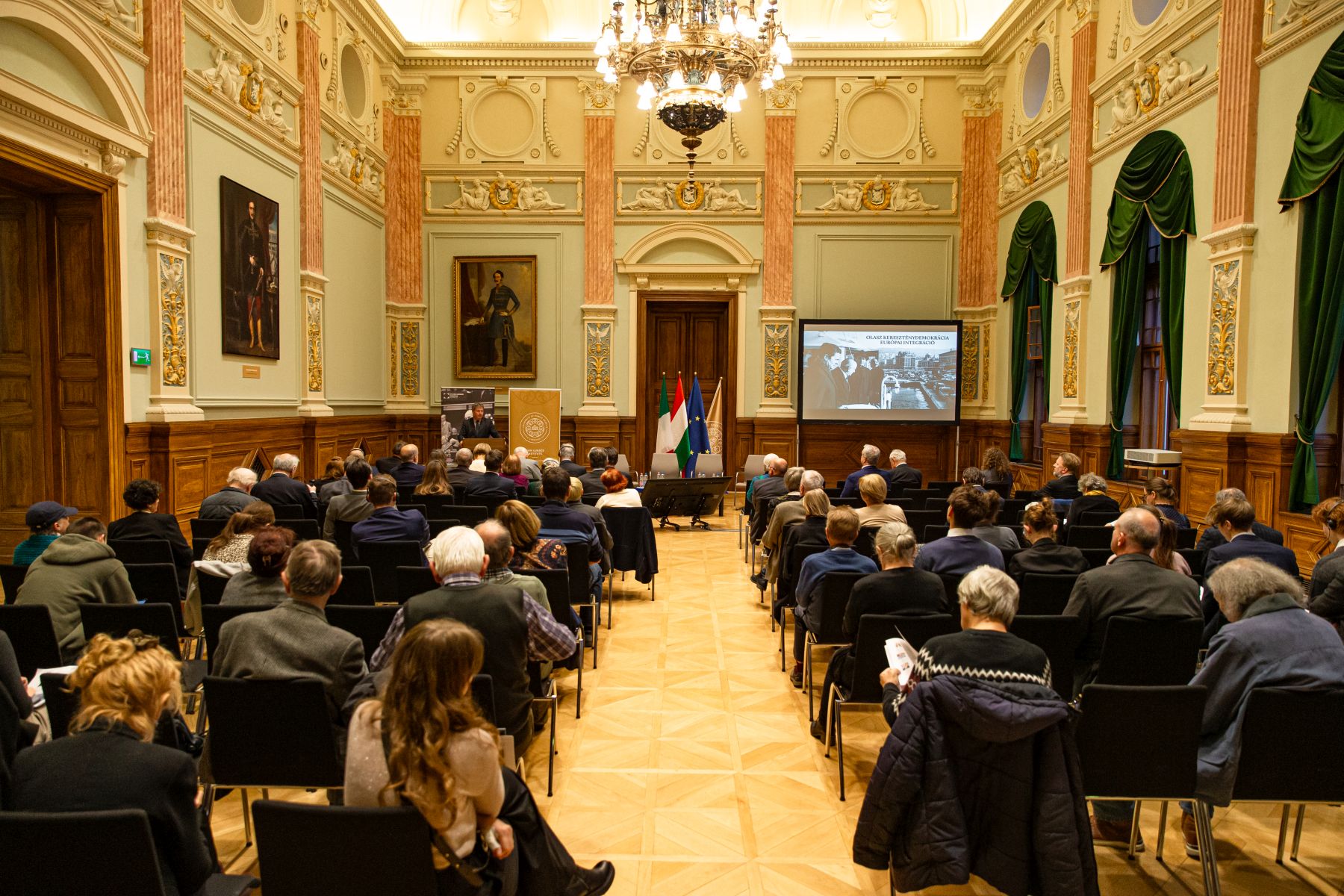The Otto von Habsburg Foundation, together with the John Lukacs Institute at the Ludovika University of Public Service (NKE JLI), organised a conference in honour of Franz Josef Strauss (1915–1988). In his welcome speech, Gergely Prőhle, Director of our Foundation and Programme Director of the NKE JLI, praised Strauss’s decades-long efforts to promote German unity and, invoking the notion of subsidiarity from the conference title, noted that his ideas remain highly relevant in today’s contest between integrationist and sovereignty-minded forces that sharply divide Europe.
Gergely Gulyás recalled Strauss’s Renaissance-like personality. The CSU leader, with his intense presence, outstanding rhetorical skills, and characteristically populist conduct, made a compelling case for the principle of dual sovereignty he often advocated – regional Bavarian and German identity – while taking into account the fate of Central Europe’s nations and geopolitical realities. The Minister in charge of the Prime Minister’s Office concluded with one of Strauss’s favourite bon mots: “Irren ist menschlich, aber immer irren ist sozialdemokratisch.” (“To err is human, but to keep on erring is social democratic.”)
“Bavaria is our home, Germany our fatherland, Europe our future” – historian Horst Möller also quoted the Bavarian leader. The speaker traced Strauss’s career from his early years with Adenauer to his tenure as Federal Minister, during which he made his mark in nuclear policy, defence, and finance. Strauss was a consistent advocate of the CDU/CSU alliance throughout his political path. The renowned historian described him as a formidable statesman who was able to overcome even his defeat in the 1980 chancellor’s election campaign. During his term as prime minister (1978–1986), he pursued an active foreign policy in parallel with the party alliance and was responsible for many of the achievements that shaped his state’s long-term future.
In his two books – Entwurf für Europa (1966), Herausforderung und Antwort. Ein Programm für Europa (1968) – he summarised his policy on Europe. In them, the statesman expressed his belief in the sovereignty of the European peoples and the principle of subsidiarity, and, already at that time, called for curbing the inexorable growth of bureaucracy. However, his career was not without mistakes: his contemporaries had already been critical of his less-than-cordial relationship with Helmut Kohl, the tensions he repeatedly stirred up within the CSU, and his confrontational attitude towards the media – the culmination of which was undoubtedly the Spiegel affair of 1962. He was, therefore, not without reason regarded as the daredevil of German politics, but even his opponents did not dispute his remarkable abilities.
The first lecturer in this historical overview section, Vanessa Conze, examined the relationship between Franz Josef Strauss and the Pan-European Union, situating the movement within the ideological landscape of 1970s European politics. Otto von Habsburg’s presidency, which began in 1973, revitalised the then limited-reaching group, adapting it to contemporary challenges, and soon establishing its position as an umbrella organisation for Christian-conservative-oriented social initiatives on the continent. Strauss and the CSU proved to be one of, if not the most, active partners of Otto in pursuing these ambitions. Their cooperation was facilitated by mutual sympathy between the two politicians, despite their entirely different socio-cultural backgrounds; Otto von Habsburg even referred to Strauss repeatedly as a mentor. And although the latter was not a member of the PEU, he recognised and exploited the potential of their partnership in many ways to achieve his own objectives.
The Cold War was a key element in German–German relations of the era, as the Yalta system was based on the division of Germany. Strauss saw an opportunity to destabilise the communist regime by engaging with the troubled East German economy in the early 1980s and succeeded in brokering a previously unthinkable loan of one billion marks. Marco Gerhard Schinze-Gerber, the Bavarian Prime Minister’s monographer, spoke about this in his richly illustrated presentation.
Nóra Szekér, a researcher at the Historical Archives of the Hungarian State Security, addressed the perception of the CSU head during the Kádár era. She revealed that the Hungarian party leadership had a realistic understanding of the ‘target’ based on intelligence reports, and the diplomatic background of his private visit to Hungary in 1977 was a textbook example of the so-called ‘independence’ of Hungarian foreign policy at the time. This question was further explored by Andreas Schmidt-Schweizer, a historian who took stock of the motives behind the Bavarian-Hungarian rapprochement that Strauss had encouraged and explained their impact on the bilateral relations between the sides.
Bence Kocsev used excerpts from the correspondence between Franz Josef Strauss and Otto von Habsburg to highlight their relationship, described as an ‘elective affinity’ – borrowing Max Weber’s term – between personalities of different characteristics, with shared goals and extensive historical and geographical knowledge. As our colleague pointed out, the interdependence was mutual because Otto’s Catholic-conservative cosmopolitanism could serve as a fitting counterpoint to the social-democratic internationalism of Willy Brandt and the left of German politics.
The head of the Brussels office of the Hanns-Seidel-Stiftung (HSS) analysed the realpolitik of Franz Josef Strauss. Thomas Leeb portrayed the CSU politician, who had consciously pursued a political career since his youth, as a determined Christian Democrat who exerted decisive influence on the development of his party and the European People’s Party. His outspoken anti-communism, his commitment to the transatlantic cause, which went hand in hand with his insistence on the integration of a continent without the Soviet Union, and his support for the Franco–German axis were complemented by his advocacy of a common European defence force. If these issues are more topical today than ever, Strauss is not the one to blame.
The concluding panel of the commemorative conference was a roundtable discussion featuring distinguished representatives of German politics over the past half-century. Former SPD Federal Minister Klaus von Dohnanyi, in a video message from his home in Hamburg, recalled his fellow politician, underlining his significance with the rhetorical question: What would Bavaria be today without Strauss, and what would Germany be without Bavaria? Peter Gauweiler, former Member of the Bundestag and Bavarian Minister of State, presented Strauss’s work in historical perspective and, in addition to his work as an army organiser, emphasised his foreign policy views and initiatives, which were often considered uncomfortably unconventional in official German diplomacy. It was this reason, he noted, that 70 states were represented at the politician’s funeral, and even Erich Honecker contemplated attending the funeral service for a long time. Hans-Friedrich Freiherr von Solemacher, the former head of the HSS office in Budapest, and Fritz Goergen, former Federal Executive Director of the FDP, responding to questions from journalist and media expert Boris Kálnoky, evoked the portrait of a clear-minded, perceptive politician without whom the West would have found it increasingly difficult to weather the decades of the Cold War.


























